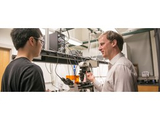Matt Pelton receives NSF CAREER Award
Grant will advance his research on vibrating nanoparticles
This story initially appeared on news.umbc.edu and was written by Megan Hanks.
Matt Pelton, assistant professor of physics, has received the prominent CAREER Award from the National Science Foundation (NSF) to advance his research on vibrating nanoparticles. His award totals approximately $650,000 over five years, and his research will focus on how nanoparticles act in various liquids, to understand the unique ways in which mechanical energy flows at the nanometer scale.
“We congratulate Dr. Pelton on his NSF CAREER Award, a recognition of his work and dedication to impacting other scientific fields through his research,” said Karl V. Steiner, vice president for research. “This recognition of Dr. Pelton adds to our growing list of outstanding young faculty who are receiving this high level of peer-based recognition from NSF and other sources.”
Scientists understand how conventional liquids, like water, behave on ordinary time and length scales, and how individual molecules make up liquids, but there is less understanding about liquids on intermediate scales. Pelton has developed a method based on ultrafast laser spectroscopy of vibrating metal nanoparticles suspended in liquids to understand the complex properties and molecular interactions of ordinary liquids.
“It’s like ringing a bell, but on a much smaller scale,” Pelton says of his work. When a bell is rung, it vibrates many times, and if the bell was rung and then submerged in water, it would ring fewer times than when it was not in water, he explains. And if the same bell was rung and then submerged in honey, a viscous liquid, the bell would only ring once or twice.
The nanoparticles in liquids that Pelton studies vibrate a few billion times per second, and can be manipulated with laser pulses. These pulses cause the nanoparticles to expand and vibrate, but like a bell, they react differently depending on the liquid that they are in. Pelton is working to understand how long the nanoparticles vibrate when hit with laser pulses, and where the energy goes as the particle moves.
It is known that particles on fast time scales and short length scales do not act the way that the particles on ordinary scales behave. Pelton explains that sometimes liquids act like a solid, giving the example of cornstarch mixed with water. The mixture acts like a liquid if somebody pushes slowly on it with their finger, but someone presses quickly enough, the particles in the mixture cannot move out of the way and the mixture appears to behave like a solid. Pelton’s research shows that this happens even for an ordinary liquid, such as water, if you push on it quickly enough — such as with a vibrating nanoparticle.
By contributing new knowledge about the complex properties of liquids, Pelton’s work will expand understanding of the function of biological molecules, which live in a liquid environment, and of potential new molecular sensors based on vibrating nanoparticles.
Beyond the research methodologies and findings, Pelton shares that UMBC has allowed him to create his own, independent research group and train the “next generation of scientists in an environment that emphasizes inclusive excellence.”
“I’m particularly happy to receive the CAREER award because it recognizes both of these goals: effective teaching and innovative research,” Pelton says. “It allows me to pursue a research project that will form a cornerstone of my longer-term scientific program as a researcher and educator: to understand the unique ways in which energy flows at the nanometer scale.”
In the last two decades, UMBC faculty have received 30 NSF CAREER awards. Helena Mentis, assistant professor of information systems, is the most recent previous recipient of a CAREER award for over half a million dollars to advance her research on gesture-based tools that can be used by remote surgeons to share expert knowledge in the operating room.
Matt Pelton works with a student in his lab. Photo by Marlayna Demond ’11 for UMBC.
Tags:
Posted: April 14, 2016, 3:57 PM
